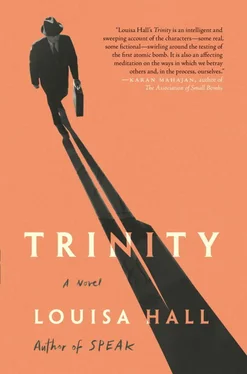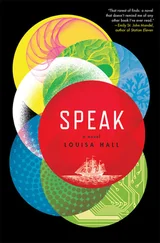Nevertheless, however, before I’d looked away, I’d already seen a man with no face.
His face was a smudge of black charcoal.
Seeing it knocked the air from my body.
Some people celebrate, I thought. Some people set off firecrackers on the hill behind the tennis court, and they wear camel-hair coats and knee socks and go to school and eat breakfast.
And some people starve, wasting away in crowded hospitals full of people who no longer have faces.
It made me feel sick. But God help me, it also made me so hungry.
I felt the claw of my hunger, and I wanted to eat. I wanted to be a well-fed survivor.
So then I finished the bowl of cereal that I’d poured, and I went back for seconds, and when the box had been emptied I went to the refrigerator, where I devoured both string beans my mother had saved.
Then I opened the freezer and pulled out the cookies my mother kept hidden. And I knew I didn’t have very much time, so I didn’t bother to thaw them out or even put them in the oven, I just started using my teeth to tear off rock-hard hunks of those cookies.
It’s amazing my teeth didn’t break off. If they had, I guess, I’d have eaten them also. As it was, I kept eating those frozen cookies until my sister came down to the kitchen. Then I tried to shove the bag back into the freezer, but my mother was already there in the doorway.
She stood there in her yellow wool suit with mother-of-pearl buttons, and her white gloves that only just came past her wrist bones, and she was shaking with fury.
At that point, I couldn’t spit out the last bite. But I also couldn’t swallow it. The bite was far too big, and solidly frozen, so I could only stand there by the freezer, holding an egg-sized rock in my gullet.
“What are you eating?” my mother said.
I couldn’t answer.
By then my mother was shaking with rage. She was so small and so angry. I had attacked her; I’d stolen her secret hoard. I’d violated what space she’d preserved on this planet, and her whole face was a furious bird’s beak.
“What are you eating?” she said again, and still I didn’t answer. It was as if I had one of her eggs in my mouth. Then she took a few steps closer and faced me.
“You liar,” she said. “You little snake.”
Both of us, I think, were frightened by the scale of the thing. It was so much bigger than we were. It was a conflict on a scale we couldn’t manage.
Some people eat, and some don’t. That was the main problem. In Ireland, for instance, during the famine, as we were often told when we were children, mothers were expected to starve while their children ate. They were expected to give of their bodies, to rise above the necessity of their hunger, and there I was, in the nice house my mother provided, wearing the nice clothes that she bought me, unabashedly and selfishly eating, and before either one of us had quite comprehended the problem, my mother had already taken my jaw in her hand and pried open my mouth so I’d spit out the cookie.
Then we stood side by side, looking down at that mess, the regurgitated food in her palm.
And only then did my mother become human again, not some vengeful mythical angel.
Then she was nothing more than a small woman, or perhaps a large bird, hunched and inconsolable beside her snake of a daughter.
AFTER THAT, MY MOTHER WENT OUT FOR A DRIVE.
I stayed in the kitchen with my twin sister. And it was then that I realized that while my mother and I had been enacting our own personal drama, my sister had gone to the table. She was staring at the newspaper, and her whole body was trembling.
She hadn’t touched the cereal she’d poured for herself. That morning she went to school without eating.
My sister could submit herself to a cause. She had the willpower I lacked, and a crueler sense of aesthetics.
AFTER THAT MORNING, SHE ATE LESS AND LESS.
She also started the project she continued from that day forward, collecting photographs from Hiroshima and Nagasaki.
She arranged them in the book our mother bought her, along with factoids about the lingering effects of the blasts. She had a clear eye for how such images should be arranged, an understanding of design that I lacked. Once, for instance, in our junior year at St. Stephen’s, in the unit of home economics when we were learning how to decorate our bomb shelters in a style befitting our aspirations, we were sitting under our desks, and I was embroidering a needlepoint. I only half-listened while the teacher droned on about beautifying a room with no windows, about adding a feminine touch to an underground bunker. Mostly, however, I focused on anticipating the needlepoint my sister was making, in the hopes that maybe I could outdo her.
Her work was always more perfect than mine. She had predictably impeccable taste. By contrast, my style was exuberant and confused. I couldn’t ever resist the inclination to add. So when the teacher stopped talking and we’d come out from under our desks and shared the samplers we’d sewn in our shelters, mine was sloppy and fat, a bloody mess of embroidery threads.
Then my sister revealed the sampler she’d made. All of us stared. The teacher turned pale. Because, of course, her sampler was perfect. It was entirely empty. A pure white circle of cloth, bound in a wood frame.
Which, needless to say, was much better than mine, untouched as it was, and still spotless.
ALL OF WHICH IS TO SAY THAT IN THE RESTAURANT KATHY HAD CHOSENin Princeton, while she flared her nostrils and my sister starved, I sawed my dolphin fins in the air and cut through the bloody steak I’d been given.
Meanwhile, Kathy’s respectable boyfriend was saying that friends of his from the force had come home with stories of being compelled—for lack of meaningful targets, since even the smallest villages had already been completely destroyed—to drop their bombs into rivers, or on footbridges, or into little copses of trees.
And meanwhile the roommate had finished his beer. And he smiled at me every so often, and seemed to be having an excellent evening, unaware that our story had taken such a violent turn, me having cut all ties with Kathy, finishing my second bourbon, heading out into the darkness with or without him.
From that point on I ignored all Kathy’s efforts to intervene on my behalf. By the time she insisted that it was time to head back to the room we’d reserved in the boardinghouse for nice girls visiting Princeton, I was already somewhat drunkenly making my way back to that roommate’s dorm room, my laughter fat and obscene in the darkness, his hands creeping over my dolphiny body. Then I was under him on the bed, with my fat fins flopping each which way, and then I realized my stockings had torn, and for a moment I felt trapped and frightened.
Then I slipped out of my body. From somewhere above, I watched my reckless body in bed. My hair was a mess. My clothes were a mess. Even my breasts were a gross, exposed mess, and there was the roommate’s hand inserting itself into my mouth, and I was sucking it like that kind of girl, the kind of girl my mother never imagined her girls would become, and by then, watching myself, even high up on the ceiling, I could have cried, though of course, as I knew well, it wasn’t that roommate’s fault in the slightest.
He was only playing the part I gave him to play, just as I was playing the part I’d given myself, the role I had to play to appropriately balance the others.
And then, of course, pinned there in that roommate’s bedroom, I thought of my sister.
I thought of her lying at home in our childhood bedroom, looking through the pages of her hideous book.
I thought to myself that she had been steadily retreating from life since the day she decided to eat less. And ever since the same day, I’d been forced to charge into life with an abandon that just wasn’t healthy. I’d lived as if there were a thread between me and my sister, as if I’d gone to retrieve her from the underworld, and tied one end of the rope around her dwindling waist, and the other end around my own, and now I was running uphill, charging into the land of the living.
Читать дальше












